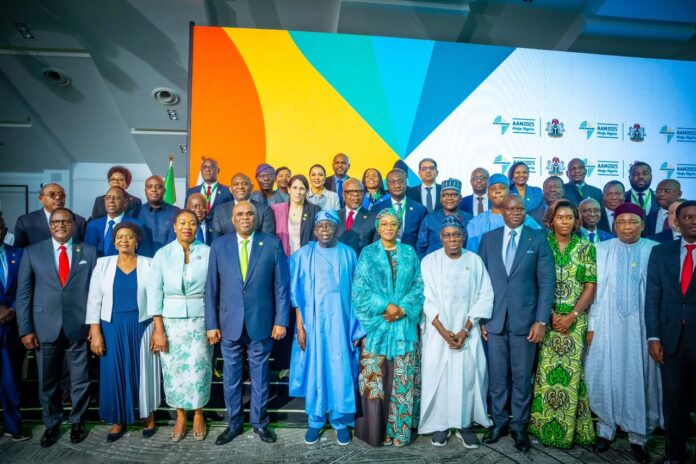In a glowing tribute to decades of economic diplomacy and visionary banking leadership, President Bola Ahmed Tinubu on Friday conferred the national honour of Grand Commander of the Order of the Niger (GCON) on outgoing President and Chairman of the Board of the African Export-Import Bank (Afreximbank), Professor Benedict Oramah.
The surprise recognition came during the 32nd Annual General Meetings of Afreximbank held in Abuja, where Tinubu hailed Prof. Oramah’s contributions to Africa’s development, trade integration, and Nigeria’s strategic economic interests. “Today is your day, Prof. Oramah,” Tinubu said during his remarks. “You have led with vision, consistency and an unwavering belief in Africa. It is my honour and privilege to confer upon you one of our country’s highest recognitions—the Grand Commander of the Order of the Niger (GCON).”
Oramah, who began his journey with the bank in 1993 and spent a decade as its President and Board Chair, was instrumental in expanding Afreximbank’s assets from $5 billion to over $37 billion, driving continent-wide industrialisation, supporting Africa’s COVID-19 vaccine access, and bolstering trade finance across sectors.
Under Oramah’s leadership, Afreximbank was pivotal in mobilising over $120 billion for African development projects in 2020 alone. Notably, the bank facilitated financing for 400 million doses of COVID-19 vaccines and funded critical infrastructure such as the Dangote and BUA Refineries and the African Medical Centre of Excellence. Tinubu noted that Nigeria had benefited from over $52 billion in support from the bank—invested in energy, agriculture, healthcare, infrastructure, manufacturing, and creative industries.
“This partnership goes beyond capital,” the President said. “We are collaborating on transformative ventures such as the Africa Energy Bank headquartered in Abuja, and the Pan-African Payment and Settlement System (PAPSS), which will drive financial independence through cross-border trade in local currencies.” He added that Nigeria, with Afreximbank’s support, is poised to become Africa’s fertiliser hub by scaling production to 7.5 million tonnes annually, while new trade infrastructure like the $3.5 billion Bakassi Deep Seaport aims to boost logistics and continental market access.
President Tinubu urged African leaders to deepen institutional cooperation and financial integration. He emphasized the importance of PAPSS, the Creative Africa Nexus (CANEX), and the Fund for Export Development in Africa (FEDA) in supporting African entrepreneurship, SMEs, and regional self-reliance. “As the world grows more fragmented, Africa must double down on its institutions,” Tinubu warned. “Let us strengthen Afreximbank to scale its impact and empower our youth, women, and entrepreneurs to define the future.”
The theme of this year’s AGM, “Building the Future on Decades of Resilience,” resonated strongly as Tinubu laid out Nigeria’s reform journey under his Renewed Hope Agenda—highlighting painful but necessary economic decisions like subsidy removal and exchange rate unification. “We recorded a GDP growth of 3.4% in 2024,” he said. “Oil production is up to 1.5 million barrels per day with a 2.5 million target in sight. Inflation is easing, investor confidence is rising, and debt servicing has dropped from 96% to below 65%.”
Tinubu also touted progress in critical sectors, noting that ₦45.9 billion had been spent on upgrading 8,800 primary healthcare centres across the country. He said the administration’s new student loan scheme had ensured that no child would be denied access to higher education because of financial hardship. He pointed out that more than 100,000 Nigerians had already enrolled in the new national consumer credit scheme, with another 400,000 queued up for the next phase. On the infrastructure front, the President announced that over 279 roads had been completed, with 65 others under construction and 260 rural road projects already executed. He highlighted major expressways such as the Lagos-Calabar Coastal Highway, the Sokoto-Badagry Superhighway, and the Abuja-Kaduna-Kano Road as game-changers for logistics and regional trade.
Digital inclusion, he said, was also gaining momentum through the deployment of thousands of kilometres of fibre-optic cables across the country to bridge the connectivity gap and encourage innovation.
In his parting remarks, Prof. Oramah thanked his colleagues, African leaders, and stakeholders for supporting his tenure. “I gave the job the best of my energy, talent and intellect,” he said, noting that 50 to 70 per cent of Afreximbank’s $1.35 billion dividend had been reinvested by shareholders—evidence, he said, of the trust the bank had earned. He projected that with continued reforms and strong governance, Afreximbank could grow to $250 billion in assets in the next decade.
The Coordinating Minister of the Economy and Minister of Finance, Wale Edun, praised President Tinubu for approving the hosting of the AGM in Abuja, and thanked Afreximbank for supporting the private sector and opening both the African Trade Centre and a world-class medical centre in Nigeria.
The high-profile gathering was attended by dignitaries including former Nigerian President Olusegun Obasanjo, former Ghanaian President Nana Akufo-Addo, former Senegalese President Macky Sall, former Nigerien President Mahamadou Issoufou, and former Nigerian Vice Presidents Namadi Sambo and Yemi Osinbajo.

